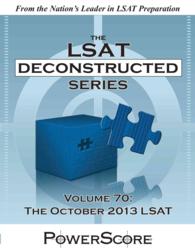Full Description
This book is the second of a series in which experts engage critically with the context, criteria and consequences of expropriation. The State, in the shape of monarchies, dictatorships, or democracies, has been using expropriation to implement its policies since the times of ancient Rome. This book therefore contains contributions on the historical context of expropriation. Despite its age, however, expropriation law is constantly evolving at the national and international level. The contributors show how European human rights law and international soft law instruments shape national criteria and expropriation procedures. They discuss how comparative law and insights from the theory of human flourishing can help to improve the criteria for the justification of expropriation. From comparative and international perspectives, the contributors deal with the criteria that determine whether compensation is due for a regulatory taking, constructive expropriation or excessive regulation of property. The contributors examine the definition of takings and whether the dissolution of condominium constitutes a taking.They uncover how the amount of compensation can play a role in the justification of expropriation.Lastly, the contributors examine the consequences of expropriation for residential communities.
Contents
Preface; 1. Rethinking Public Interest in Expropriation LawIntroductory Observations; 2. Public Interest in Takings Cases in Italy and France: The Constitutional and Human Rights Dimension; 3. The Poverty of Precedent on Public Purpose/Interest: An Analysis of Pre-Constitutional and Post-Apartheid Jurisprudence in South Africa; 4. "Somewhat at Sea": Public Use and Third-Party Transfer Limits in Two US States; 5. Reviewing Expropriations: Looking beyond Constitutional Property Clauses; 6. In the Shadow of Zimbabwe: Public Interest, Land Reform, and the Transfer of Property in South Africa; 7. Reclaiming Property: Changes of Purpose or Non-Realization of Public Purpose after Expropriation; 8. Exactions and the Rule of Law; 9. The Public Purpose for the Expropriation of Land: A Framework for Assessing Its Democratic Legitimacy; 10. The 'Land Assembly Districts' Solution to Third-Party Transfers; 11. Fundamental Premises of Land Expropriation in Poland; 12. Less Invasive Means: The Relationship between Sections 25 and 36 of the Constitution of the Republic of South Africa, 1996; 13. Expropriatory Compensation, Distributive Justice, and the Rule of Law; 14. The Public Purpose Requirement in the Calculation of Just and Equitable Compensation; 15. When Does State Action Amount to Expropriation? Recent Australian Developments.








